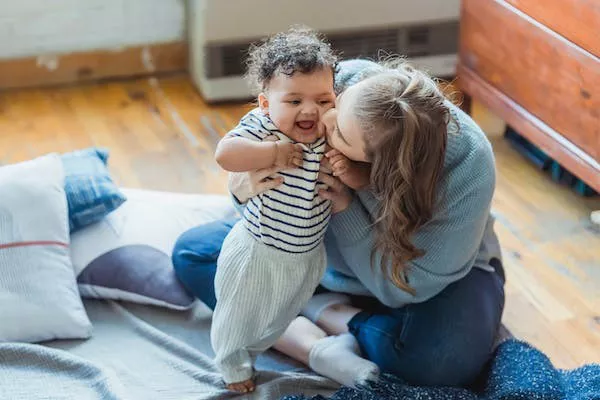The first year of a baby’s life is an incredible journey of growth and discovery. At around six months old, your little one is on the cusp of exciting developmental milestones. This stage marks a significant leap in their physical, cognitive, communication, and social skills. In this comprehensive guide, we will delve deeper into the various developmental skills you can expect to witness in your 6-month-old baby. Understanding these milestones will help you support and celebrate their progress as they continue to thrive and flourish.
Motor Skills:
a. Fine Motor Skills:
Grasping Objects: By six months, most babies have developed the ability to intentionally reach out and grasp objects using their hands. They can hold toys, grasp their caregivers’ fingers, and even transfer objects from one hand to the other. Encourage their fine motor skills by providing toys of different shapes and textures to explore and manipulate.
Pincer Grasp: At this age, babies begin to refine their hand movements and develop the pincer grasp. They use their thumb and index finger to pick up small objects or pieces of food. Offer finger foods or toys that promote the use of the pincer grasp to further enhance their fine motor skills.
Exploring with Mouth: Babies explore objects by bringing them to their mouth, which helps them learn about textures, shapes, and tastes. Ensure a safe environment and offer baby-safe toys that can be explored orally to stimulate their sensory development.
b. Gross Motor Skills:
Rolling Over: By six months, many babies have mastered the art of rolling over. They can flip from their stomachs to their backs and vice versa. This newfound mobility opens up a world of exploration and encourages their gross motor development. Create a safe space for them to roll and explore their surroundings.
Sitting with Support: As their neck muscles strengthen, babies become more adept at sitting with support. They may prop themselves up on their hands or use cushions for stability. Encourage their sitting skills by providing a supportive sitting position and interactive toys to play with while seated.
Increased Mobility: Some babies may show signs of scooting or attempting to crawl at around six months. They may use their arms and legs to move around on their stomachs or push themselves forward. Ensure a safe environment and provide ample floor time for them to practice their emerging mobility skills.
Cognitive Skills:
a. Object Permanence: At around six months, babies begin to develop a sense of object permanence. They understand that objects continue to exist even when they are out of sight. This milestone opens up a world of possibilities for memory and problem-solving abilities. Play peek-a-boo or hide objects under a blanket to engage your baby’s sense of object permanence.
b. Cause and Effect: Around six months, babies begin to grasp the concept of cause and effect. They start to understand that their actions can produce specific outcomes. For example, they might shake a rattle to produce a sound or press a button to activate a toy. Encourage their exploration of cause and effect by providing toys that offer different responses based on their actions.
c. Attention and Exploration: At this age, babies become more alert and engaged with their environment. They begin to pay attention to their surroundings, visually tracking moving objects and exploring them with their hands and mouths. Provide a variety of age-appropriate toys and objects for them to observe, touch, and manipulate, stimulating their curiosity and cognitive development.
Communication and Social Skills:
a. Babbling: Around six months, babies engage in more vocalization and babbling. They experiment with a range of sounds and syllables, laying the foundation for language development. Encourage their babbling by engaging in conversations, imitating their sounds, and responding to their vocalizations.
b. Responsive Smiling: Babies at this age develop social smiles, meaning they smile in response to social interactions and their caregivers’ faces. This reciprocal smiling strengthens the bond between the baby and their caregivers. Respond to their smiles with warmth and positive facial expressions, reinforcing their social and emotional connections.
c. Recognizing Familiar Faces: By six months, babies can distinguish familiar faces from strangers. They exhibit a preference for their primary caregivers and may display separation anxiety when separated from them. Encourage social interactions by introducing them to new faces in a calm and supportive environment.
d. Turn-Taking: Babies begin to engage in turn-taking interactions, imitating sounds or movements initiated by their caregivers. These back-and-forth exchanges lay the foundation for early communication skills. Engage in simple games like peek-a-boo or imitating their sounds to foster their turn-taking abilities.
Sensory and Cognitive Exploration:
a. Hand-Eye Coordination: At six months, babies demonstrate improved hand-eye coordination. They can accurately reach for and grab objects they are visually tracking. Offer toys that require reaching, grasping, and manipulating to strengthen their hand-eye coordination skills.
b. Exploring Textures: Babies are naturally curious about different textures. At this age, they enjoy touching and mouthing objects to explore their tactile qualities. Offer a variety of safe and textured objects for them to explore, promoting their sensory development.
c. Visual Tracking: By six months, babies can track moving objects with their eyes smoothly. They can visually follow people or objects as they move across their field of vision. Engage in playful activities that involve moving objects to enhance their visual tracking skills.
Conclusion:
As your 6-month-old baby continues to grow and develop, they will reach significant milestones in their motor, cognitive, communication, and social skills. These milestones are a testament to their incredible progress and the exciting journey they are embarking on. Remember that each baby is unique and may develop at their own pace. Provide a nurturing environment, offer stimulating toys and experiences, and cherish these precious moments of discovery and growth. Celebrate their achievements, and enjoy the remarkable journey of parenting a 6-month-old baby.


